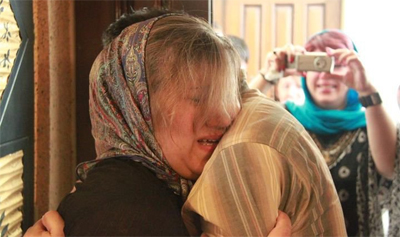New York, August 10, 2011–The Committee to Protect Journalists is concerned about a rise in the number of imprisoned journalists in Iran and the continuing deterioration of their health. In recent days, Iranian authorities increased a prominent journalist’s prison term by two years and arrested a critical journalist who had just finished serving a prison sentence. Other journalists have suffered from declining health as a result of substandard conditions, extended periods in solitary confinement, and intentional abuse, according to news reports.
“Iran continues to defy its own laws as well as international legal norms by engaging in systematic neglect and abuse against journalists and the arbitrary denial of their basic rights,” said Mohamed Abdel Dayem, CPJ Middle East and North Africa program coordinator. “Authorities continue to routinely deploy punitive measures and physical violence against journalists who refuse to toe the government line.”
Judicial authorities informed imprisoned veteran journalist Issa Saharkhiz on Thursday that his prison term would be extended by two additional years for “prior journalistic activities,” the reformist news website Jonbesh-e-Rah-e-Sabz reported. In September 2010, the Revolutionary Court sentenced Saharkhiz, whose career in journalism spans more than two decades, to a three-year prison term, a five-year ban on political and journalistic activities, and a one-year ban on foreign travel. He was first arrested in the aftermath of Iran’s disputed presidential elections. Since his detention in July 2009, Saharkhiz has been a regular target of government harassment, including being kept in a prison yard overnight in freezing temperatures without shoes or socks, CPJ research showed. In a recent interview, the journalist’s son, Mehdi Saharkhiz, said that at various times during his imprisonment, his father has suffered from high blood pressure, a torn eardrum, and back pain, and for a time had been confined to a wheelchair. He added that his father requires the attention of a specialist, but his medical requests have been denied.
Journalist Ahmad Zaid-Abadi, who had been imprisoned since June 2009, was granted a 48-hour furlough on Thursday after posting US$500,000 bail, according to the news website Rooz Online. Two days later, Zaid-Abadi turned himself in to authorities but was told that his furlough had been extended. One day later, on August 7, Rooz Online said, authorities summoned the journalist back to prison, where he remains. He was sentenced last year to six years in prison, five years’ exile to Gonabad, a city in Khorasan province, and a “lifetime deprivation of any political activity” including “interviews, speech[es], and analyses of events, whether in written or oral form.” Zaid-Abadi won the UNESCO/Guillermo Cano World Press Freedom Prize in 2011 and the World Association of Newspapers’ Golden Pen of Freedom Award in 2010.
In early August, Kouhyar Goudarzi, who writes for the Committee of Human Rights Reporters (CHRR), and his mother, Parvin Mokhtare, were arrested by Iranian authorities for unknown reasons, according to CHRR. Mokhtare was arrested in Kerman (621 miles [1,000 kilometers] south of Tehran), where she is currently being detained, multiple news websites reported. Jonbesh-e-Rah-e-Sabz has emphasized that she is not involved in any political activities. A recent update from news website Kaleme reported that in a phone call from Kerman Prison, Mokhtare said she is being held with prisoners tried for murder and drug trafficking and described the prison’s poor hygienic conditions and lack of basic amenities. She said she had been informed of her charges, which included “insulting the Supreme Leader,” “propagating against the regime,” and “acting against national security” in the interviews she gave during her son’s prison term.
Goudarzi’s whereabouts are unknown. The journalist was initially arrested in December 2009 and served a one-year sentence for his journalistic activities at CHRR. He was charged with heresy, “propagating against the regime,” and “participating in illegal congregations,” CPJ reported. Goudarzi is a recipient of the National Press Club’s John Aubuchon Freedom of the Press Award in 2010.
On July 27, Ali Kalaee, a former member of CHHR, was summoned to serve a seven-year sentence at Evin Prison, the organization reported. He had three days to turn himself in to Evin Prison and begin his sentence. Kalaee’s lawyer appealed the sentence, but it was upheld. According to CHHR, the journalist’s mother also received a notice from the “Implementation Unit” at Evin Prison Court stating she had 20 days to turn her son in or else her property, which she had put up as collateral for her son’s bail, would be confiscated by the court. Kalaee was first sentenced in December 2009 and received a one-year term for “propagating against the regime” and a five-year sentence for “assembly and collusion with the intent to commit a crime” because of his involvement with CHHR, and was sentenced to a one-year suspended prison sentence last December for an earlier 2007 arrest.
Kayvan Samimi, the editor of the now-defunct monthly Nameh, who has been imprisoned since June 2009, is suffering from life-threatening liver complications, news outlets reported. The veteran journalist has been subjected to ill treatment numerous times during his time in custody, and in February 2010, local activists reported that he had been transferred to solitary confinement after he objected to substandard conditions. His family visits were also cancelled. In 2010, Samimi was sentenced to a six-year prison term and a lifetime ban on political activity on the charges of “propagating against the regime” and “assembly and collusion to disturb national security.” An appeals court reduced the lifetime ban to 15 years.
